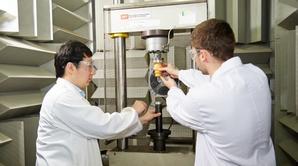By Nina Ying Sun
ASSISTANT MANAGING EDITOR
Published: June 20, 2014 11:45 am ET
Updated: June 20, 2014 11:47 am ET

Image By: BASF SE
BASF engineers testing compounds made with Cellasto at the expanded Pudong center.
With three expansion projects coming on stream at its Pudong campus in Shanghai, BASF SE is bringing significant capacity increases for engineering resin compounds and polyurethane materials and components.
The German chemical giant said its biggest compounding facility in the Asia Pacific region for Ultramid nylon and Ultradur polybutylene terephthalate compounds has started operation ahead of schedule. The total capacity has more than doubled from 45,000 metric tons to more than 100,000 tons per year, BASF said in a news release.
The expansion, which was completed more than six months ahead of schedule, also includes a compounding line for specialty grades for specialty applications.
With this plant and the upcoming compounding plant in Yesan, South Korea, which is expected to start production at the end of 2015, BASF’s overall compounding capacity in Asia will rise from 130,000 tons at present to 225,000 tons.
BASF estimates the Asia Pacific market for engineering plastics will grow on average by about 7 percent per year, driven by the increasing usage of engineering plastics in transportation, construction, high-speed railway, as well as the electrical and electronics industry.
It also aims to capture the demand created by China’s massive urbanization, with 100 million people moving into cities between now and 2020.
BASF recently introduced coextrudable Ultradur PBT to reinforce thermally insulated PVC window profiles. It hopes to play a role in China’s mission to build more energy-efficient buildings. The percentage of such buildings among new construction is expected rise from currently 2 percent to 50 percent in 2020.
In order to better serve the auto market, BASF is adding three production lines of its Cellasto microcellular polyurethane components, expanding the technical center, and conducting technical improvements of existing facilities. The production capacity will be doubled after the project completion in 2015.
Cellasto components are used by the auto industry mainly as jounce bumpers, top mounts and coil spring isolators for suspension, as well as other NVH parts. BASF currently produces Cellasto at six sites worldwide: Lemförde, Germany; Shanghai and Nansha, China; Guaratinguetá, Brazil; Shinshiro, Japan; and Wyandotte, Mich.
The company also announced significant capacity increase for its Elastollan thermoplastic PU without offering specific numbers. The expansion will support growth for textile, footwear, transportation, wire and cable sheathing and other industrial applications. | 